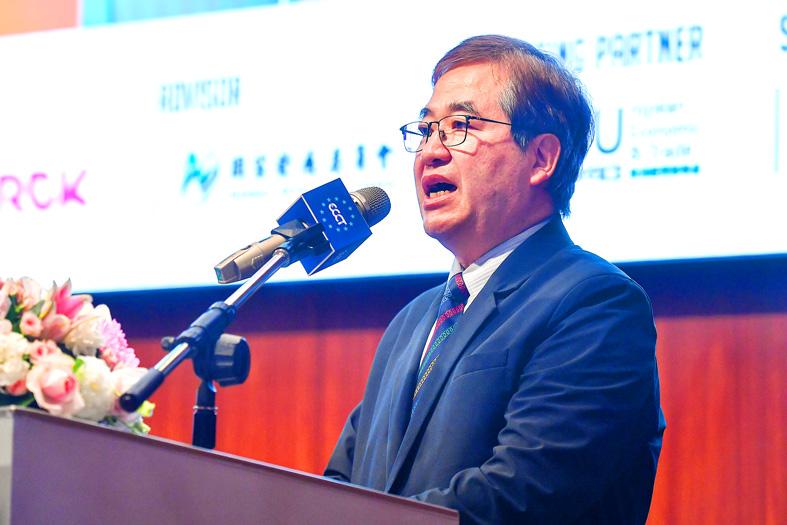The National Development Council (NDC) on Monday approved an investment of NT$38.166 billion (US$1.37 billion) over five years to upgrade seven international commercial ports in Taiwan.
The plan — which was proposed by the Ministry of Transportation and Communications — is expected to create 13,000 jobs and stimulate NT$320 billion in investment, NDC Deputy Minister Yu Chien-hwa (游建華) said.
The ministry is to launch 29 projects at the ports of Kaohsiung, Keelung, Hualien, Taichung and Taipei, as well as Tainan’s Anping and Yilan County’s Suao ports, to boost capacity, and turn them into green and smart international harbors, Yu said, citing the plan, which is to run from next year to 2026.

Photo: CNA
THROUGHPUT
Taiwan International Ports Corp (台灣港務) vice president of engineering Wang Chin-jung (王錦榮) said that the company aims to boost the total container throughput of the seven ports to 15.66 million to 18.22 million twenty-foot equivalent units (TEUs) by 2026.
It also hopes to increase total cargo throughput at the seven ports from an annual average of 1.59 billion tonnes at present to 1.80 billion tonnes by 2026, Wang said.
The ports would be developed and promoted based on their special characteristics, he said.
KAOHSIUNG EXAMPLE
For example, the Port of Kaohsiung is Taiwan’s largest port and was the 16th-busiest container port in the world last year, so Taiwan International Ports would make it a leading cargo transshipment hub in the Asia-Pacific region, Wang said.
The company hopes to increase the port’s container throughput from 9.62 million TEUs last year to 11.44 million TEUs by 2026, he said.
The Port of Taipei is to become a smart logistics center for automobiles and the Port of Taichung a base for green energy development, while the ports at Suao, Hualien and Anping are to be developed for tourism, Wang said.
Meanwhile, the Maritime Port Bureau plans to inject NT$9.7 billion into 33 projects to refurbish four domestic commercial ports — Budai in Chiayi County, Penghu, Kinmen and Matsu — to improve their competitiveness, and boost tourism and economic development near them.

CHIP WAR: Tariffs on Taiwanese chips would prompt companies to move their factories, but not necessarily to the US, unleashing a ‘global cross-sector tariff war’ US President Donald Trump would “shoot himself in the foot” if he follows through on his recent pledge to impose higher tariffs on Taiwanese and other foreign semiconductors entering the US, analysts said. Trump’s plans to raise tariffs on chips manufactured in Taiwan to as high as 100 percent would backfire, macroeconomist Henry Wu (吳嘉隆) said. He would “shoot himself in the foot,” Wu said on Saturday, as such economic measures would lead Taiwanese chip suppliers to pass on additional costs to their US clients and consumers, and ultimately cause another wave of inflation. Trump has claimed that Taiwan took up to

A start-up in Mexico is trying to help get a handle on one coastal city’s plastic waste problem by converting it into gasoline, diesel and other fuels. With less than 10 percent of the world’s plastics being recycled, Petgas’ idea is that rather than letting discarded plastic become waste, it can become productive again as fuel. Petgas developed a machine in the port city of Boca del Rio that uses pyrolysis, a thermodynamic process that heats plastics in the absence of oxygen, breaking it down to produce gasoline, diesel, kerosene, paraffin and coke. Petgas chief technology officer Carlos Parraguirre Diaz said that in

SUPPORT: The government said it would help firms deal with supply disruptions, after Trump signed orders imposing tariffs of 25 percent on imports from Canada and Mexico The government pledged to help companies with operations in Mexico, such as iPhone assembler Hon Hai Precision Industry Co (鴻海精密), also known as Foxconn Technology Group (富士康科技集團), shift production lines and investment if needed to deal with higher US tariffs. The Ministry of Economic Affairs yesterday announced measures to help local firms cope with the US tariff increases on Canada, Mexico, China and other potential areas. The ministry said that it would establish an investment and trade service center in the US to help Taiwanese firms assess the investment environment in different US states, plan supply chain relocation strategies and

Japan intends to closely monitor the impact on its currency of US President Donald Trump’s new tariffs and is worried about the international fallout from the trade imposts, Japanese Minister of Finance Katsunobu Kato said. “We need to carefully see how the exchange rate and other factors will be affected and what form US monetary policy will take in the future,” Kato said yesterday in an interview with Fuji Television. Japan is very concerned about how the tariffs might impact the global economy, he added. Kato spoke as nations and firms brace for potential repercussions after Trump unleashed the first salvo of